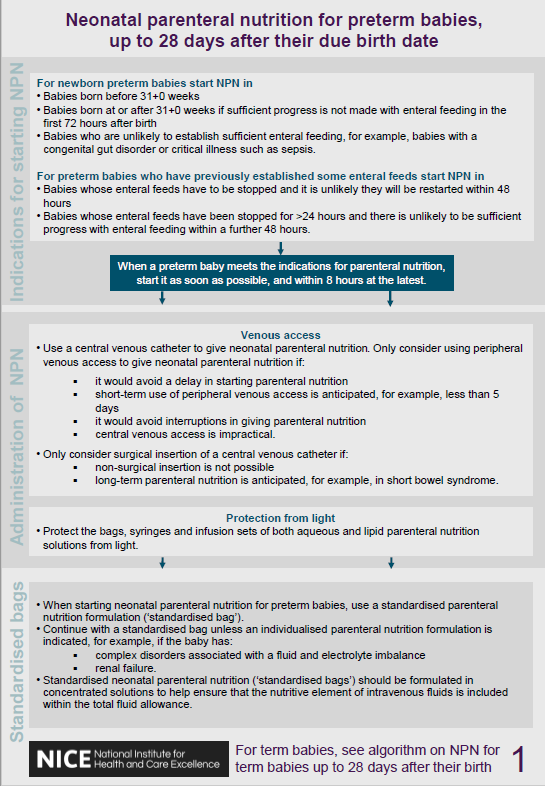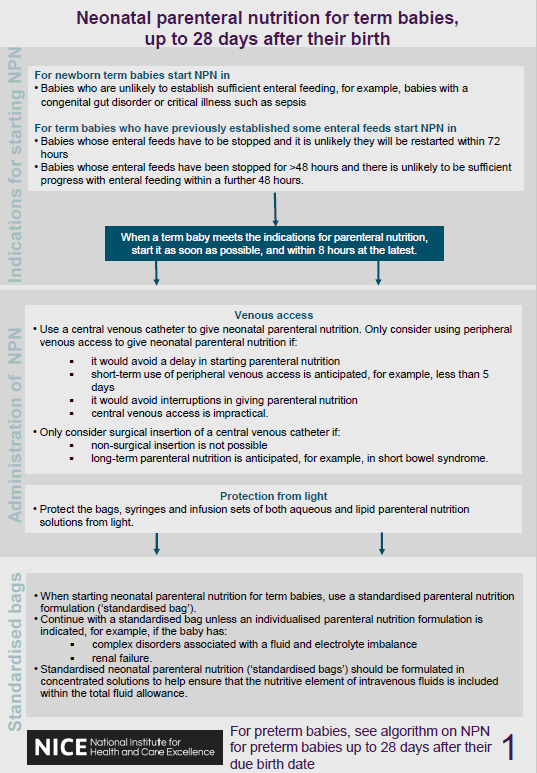Overview
This guideline covers parenteral nutrition (intravenous feeding) for babies born preterm, up to 28 days after their due birth date and babies born at term, up to 28 days after their birth. Parenteral nutrition is often needed by preterm babies, critically ill babies, and babies who need surgery.
The recommendations in this guideline were developed before the COVID-19 pandemic.
Recommendations
This guideline includes recommendations on:
- indications for, and timing of, neonatal parenteral nutrition
- administration of neonatal parenteral nutrition
- energy needs of babies on neonatal parenteral nutrition
- neonatal parenteral nutrition volume
- constituents of neonatal parenteral nutrition
- standardised neonatal parenteral nutrition formulations (‘standardised bags’)
- monitoring neonatal parenteral nutrition
- stopping neonatal parenteral nutrition
- service design
- information and support for parents and carers
NICE has also produced algorithms on:
| Neonatal parenteral nutrition for preterm babies, up to 28 days after their due birth date | Neonatal parenteral nutrition for term babies, up to 28 days after their birth |
 |
 |
Who is it for?
- Healthcare professionals who care for newborn babies
- Commissioners and providers of neonatal care services
- Parents and carers of babies who need parenteral nutrition
Guideline development process
How we develop NICE guidelines
Your responsibility
The recommendations in this guideline represent the view of NICE, arrived at after careful consideration of the evidence available. When exercising their judgement, professionals and practitioners are expected to take this guideline fully into account, alongside the individual needs, preferences and values of their patients or the people using their service. It is not mandatory to apply the recommendations, and the guideline does not override the responsibility to make decisions appropriate to the circumstances of the individual, in consultation with them and their families and carers or guardian.
All problems (adverse events) related to a medicine or medical device used for treatment or in a procedure should be reported to the Medicines and Healthcare products Regulatory Agency using the Yellow Card Scheme.
Local commissioners and providers of healthcare have a responsibility to enable the guideline to be applied when individual professionals and people using services wish to use it. They should do so in the context of local and national priorities for funding and developing services, and in light of their duties to have due regard to the need to eliminate unlawful discrimination, to advance equality of opportunity and to reduce health inequalities. Nothing in this guideline should be interpreted in a way that would be inconsistent with complying with those duties.
Commissioners and providers have a responsibility to promote an environmentally sustainable health and care system and should assess and reduce the environmental impact of implementing NICE recommendations wherever possible.